When you are foraying into online dating after 50, apart from thinking about how to make yourself stand out, find quality matches, and build connections, there’s another key concern you need to brace and prepare for: online dating scams. While there’s no denying that online dating can be an exciting and rewarding way of finding companionship later in life—that’s why 60% of single adults have considered using dating sites to meet people—this adventure should come at the cost of your safety.
Unfortunately, alongside all the genuine singles, there are also scammers lurking on dating platforms, ready to target people looking for companionship. To help you differentiate between a genuine person looking for a connection and a scammer waiting to exploit your vulnerability for their gain, we’ve put together this guide on everything you need to know to stay safe while dating online.
The Scale Of The Problem
Table of Contents
Online romance scams aren’t just a minor nuisance – they’re a massive problem that has exploded in recent years, costing Americans, especially older adults, staggering amounts of money and heartbreak. How common are these scams? Consider these eye-opening statistics:
- Romance scams now top the charts for fraud losses: Romance scams have caused more financial loss than any other type of consumer fraud reported to the FTC in recent years. According to the Federal Trade Commission (FTC), people reported losing $547 million to romance scams in 2021—an 80% increase over the year before. Then in 2022, nearly 70,000 Americans reported romance scam incidents with total losses reaching an astounding $1.3 billion
- Seniors are heavily targeted: Older adults often suffer a disproportionate share of these losses. In 2019, for example, victims over age 70 lost an average of $10,000 or more each to romance scams—far higher than younger victims. And in 2022, the FBI received reports from 7,166 victims over 60 who lost almost $419 million collectively to confidence/romance scams. That means seniors accounted for roughly one-third of all romance scam losses that year. Statistics indicate, nearly 6,000 seniors in 2023 lost over $100,000 each in these kinds of scams
- The problem has grown dramatically: Just a few years ago, losses were much lower. In 2018, reported romance scam losses were about $143 million. By 2022, that number had ballooned to $1.3 billion—almost a 10-fold increase. Reported losses to romance scams in the U.S. (2018–2023) according to FTC data. Losses jumped from $143 million in 2018 to $1.3 billion in 2022, before a slight dip to $1.1 billion in 2023

It’s important to note that these figures likely underestimate the true scale. Only about half of victims report the crime at all, according to this AARP report, often due to embarrassment or not knowing where to report. So the real losses could be even higher. Law enforcement agencies like the FBI have even established an Elder Fraud Hotline (833-372-8311) to assist older victims in reporting scams, underscoring how widespread the issue is.
Behind these numbers are real people whose trust and hearts have been abused. Scammers know that seniors may have retirement savings or assets, which makes them attractive targets. They exploit the fact that many seniors are seeking companionship and may be very trusting and generous with someone they believe cares about them. Apart from the financial loss, the emotional toll can be devastating. Victims often feel humiliated, depressed, and fearful of trying to date again.
Related Reading: 18 Online Dating Red Flags That Should Not Be Ignored
The Most Common Dating Scams Targeting Seniors
Online dating scams have been getting more and more sophisticated and innovative over time. However, a few common online dating scams targeting seniors keep recurring. targeting seniors come in many forms, but a few common storylines keep reappearing. Scammers often fabricate elaborate identities and sob stories to gain your trust, love, and ultimately your money. Here is a quick overview of the most common scams on dating sites:
As you can see, the themes are pretty consistent: there’s often a built-in reason they can’t meet in person like being overseas for military or work, some urgent crisis or opportunity that requires money, and lots of professed love and future talk to lower your guard. Now, let’s explore how these dating scam stories play out in real life:
1. Romance scams—The sweetheart swindles
This is the classic romance scam: someone creates a fake persona on a dating site or social media and cultivates an online relationship with you, sometimes over weeks or months. They shower you with affection, sweet messages, and even pet names. They may call you their soulmate and talk about a future together, moving forward at a pace that seems too fast. All of this is to make you feel loved and special but it’s essentially emotional manipulation. Once you’re emotionally invested, they start to manufacture crises or needs that require your financial help. Common warning signs of online dating fraud for seniors:
Related Reading: How To Outsmart A Romance Scammer
- They fall in love fast: The scammer will profess strong feelings within days or a couple of weeks of chatting. For example, they might say you’re the love of their life and even discuss marriage before ever meeting in person. It’s flattering but also unrealistic. They’re “love bombing” you.
- They can’t meet you face-to-face. There will always be an excuse for why they can’t video chat or travel to see you, even if you only live a few hours apart. They may send a few photos (stolen from someone else’s social media), but won’t appear live on camera. Often, they’ll claim to be working abroad—popular covers are being stationed at a remote military base, working on an offshore oil rig, or doing contract work overseas. This gives them a built-in reason to avoid physical meetups.
- An “emergency” strikes. Once the scammer thinks you’re sufficiently smitten, the asks begin. They’ll spin some urgent, often heartbreaking tale. For example, your “partner” may say, “My doctor says I need an expensive surgery and my insurance won’t cover it,” or “I was robbed. I’m stuck in a foreign country with not a dime.” These pleas are designed to make you panic and want to rescue your online sweetheart.
Ultimately, a scammer will directly or indirectly request financial help. They might ask you to wire money to an account, send gift cards, or even buy cryptocurrency for them. Romance scammers often favor methods like wire transfers and gift cards because they’re hard to trace and irreversible. Sometimes they’ll ask for smaller “temporary loans” at first, then bigger ones. Or they might ask you to open a new credit card or bank account for them, which can entangle you in fraud. One of the best ways to protect yourself from dating site scams is to remember: if someone you’ve never met in person asks you for money, it’s a huge red flag.
Romance scams can also be long cons. Some victims correspond with their scammer for months or even years, continuously sending money for one fake crisis after another. The scammer always has a reason they need a bit more: “I’ll pay you back as soon as I get my bonus,” “Just help me one last time so I can finally come home to you,” and so on.
2. Military romance scams

A very common subtype of romance scam is the “military sweetheart” scam. In this scenario, the person you meet online claims to be a member of the U.S. military, deployed overseas. They might have a profile name like “ArmyGuyMike” or “NavyOfficerJohn” and even use a photo in uniform.
Why do scammers pretend to be soldiers? Because it gains instant trust and sympathy. Many seniors are patriotic or have family who served, so they feel a connection and respect for a service member. Plus, being on a military tour handily explains why the person can’t meet up in person and may have odd hours for communication. Some red flags of a military romance scam include:
- The “soldier” quickly tries to move communication off the official dating site to private email or messaging. This is done so that the dating site can’t monitor their chats or shut them down for suspicious activity
- They often say they are widowed or a single dad/mom who lost their spouse, which tugs at the heartstrings
- They send photos in uniform that look professional because they’re likely lifted from a real military member’s social media or a public site
- After a period of sweet talk, they start hinting at money needs. Common ploys are: “I want to take leave to visit you, but the Army won’t pay for my flight. Could you send me money for a plane ticket?” or “Our unit’s food funds got delayed, I need $500 to buy supplies or I’ll be in trouble.” NOTE: The U.S. military never asks service members to pay for their own travel home or for supplies
If someone claims to be military and asks you for money for any reason, it’s not legitimate. Real military members have support networks and salaries and do not need to hit up strangers on the internet for cash. The U.S. Army Criminal Investigation Division regularly warns that Army personnel are not permitted to solicit money from the public for emergencies or travel. So if you encounter this scenario, it’s almost surely a con artist, not Captain Charming.
Related Reading: 18 Question To Ask A Romance Scammer And Stump Them
3. Inheritance & lottery scams
In an inheritance scam, a scammer will weave a story about a large sum of money that either they or you are about to receive, if certain fees are paid first. As online dating scams, these can play out in a couple of ways:
- “Help me unlock my inheritance”: The scammer claims that they are set to inherit a huge amount of money or property, however, due to some bureaucratic issue or foreign legal requirement, they can’t access the funds. They might say the inheritance is tied up in probate or in a foreign account that requires taxes or legal fees to be paid. Then comes the ask: “Once I pay $5,000 in fees, I can get the inheritance. I hate to ask, but could you loan me the money? I’ll pay you back as soon I get access to the funds. Imagine the life we’d be able to have together.” Of course, the inheritance isn’t real, and if you pay, the scammer will come up with yet another fee or simply vanish. This is basically a variation of the well-known advance-fee fraud, dressed up in romance.
- “You’ve won a prize!” In other cases, the scammer might tell you that you are going to receive money or a prize. Perhaps they claim to have entered you in a foreign lottery or contest and you won. But to collect the winnings, you must pay a processing fee or taxes up front. This is the classic lottery scam format. Sometimes the romance scammer angle is that they want to share a prize with you as their partner, or they want to send you a valuable gift, but you need to pay the customs fees. Any time someone says you must pay money to receive a larger amount of money, it’s a scam. Legitimate lotteries deduct taxes from winnings; you never pay them out of pocket to claim a prize
- Package/delivery scams: A related trick is when the scammer says they tried to send you a very special (and expensive) gift like jewelry or electronics but the package is stuck at customs. They then ask you to pay the customs clearance or insurance fee to release the package. This “important delivery” excuse is actually pretty common, according to the FTC, it accounts for about 18% of the reported romance scam. Naturally, there is no package; the scammer just wants your money.
4. Tech support or “fix-it” scams

Not all scams on dating sites are romance-driven. Sometimes scammers target seniors on dating platforms for other frauds, like tech support scams, which can overlap with romance cons. Here’s how this might play out:
- Scammer posing as tech support: You might get a message from someone who isn’t trying to woo you romantically, but instead claims to be an “administrator” or support representative from the dating site. They might say there’s a problem with your account or that you’ve won a free premium subscription, and then ask for your login credentials or credit card information to “fix” the issue or process your freebie. In reality, they are just trying to steal your passwords or financial info. No legitimate dating site admin will ever ask for your password via chat or ask you to download software. If you get unsolicited messages like this, report them to the site
- Romance scam turns into tech support scam: In some cases, an online love interest might try a secondary scam once you trust them. For example, they may claim they can help you “secure your computer” or smartphone so you can communicate more safely. They’ll instruct you to install a certain program or app. That program might actually be a remote access tool that gives them control of your device. Then they can steal sensitive data or install malware/ransomware. Never install software or apps at the urging of someone you met online unless you absolutely verify it’s legitimate. Scammers might say, “Download this video chat app so we can talk,” but if it’s not a well-known app, beware.
- Coordinated scams: Online dating scammers can also share information about victims. If you’ve been involved with a romance scammer, other scammers might target you for different schemes, like tech support fraud, since they know you’re an older adult who is online. You might receive random calls or emails claiming to be Microsoft or Apple support, saying your computer has viruses and you need to pay them to fix it. While this isn’t directly related to dating, it’s part of the fraud ecosystem that often targets seniors. Always be cautious with any unsolicited tech support communication. Real companies don’t call out of the blue and demand payment for tech issues you didn’t report
In short, be very wary of anyone asking you to divulge passwords, give remote access to your device, or send money for technical help. Scammers prey on fears that “something is wrong” with your account or device to trick you into quick action. If someone tries to target you in a similar fashion, take a deep breath, and don’t let anyone rush you into doing something on your computer or phone.
Related Reading: 10 Best Safe Dating Sites For Over 50 | 2025
5. Other common scams on dating sites
There are certainly other scams out there, with new ones popping up all the time. Here are some other common scams on dating sites you need to be mindful of:
- “Crypto investment” romance scams: A growing trend is scammers who romance you and then convince you to invest in a “sure-fire” investment, often cryptocurrency or foreign exchange, under the guise of helping secure your financial future together. This is sometimes called “pig butchering”—they fatten you up with love, then lead you to slaughter financially. They might show you fake screenshots of huge returns and guide you to a phony investment website or app. You put money in (often tens of thousands), see fake growth, and only when you try to withdraw do you realize it’s a scam. Many victims in their 50s, 60s, and beyond have lost their retirement savings this way. If a romantic interest is very eager to help you make money through some investment program they know about, be extremely cautious. Legitimate partners don’t pressure you into complex investments, especially early in a relationship
- Sextortion scams: Sometimes a romance scammer will pivot to extortion if they have compromising material, and seniors are not immune to this either. This is when someone convinces you to share intimate photos or engage in sexual video chat, then threatens to send recordings or images to your family/friends unless you pay them. Always be mindful of what you share. Even if you feel you’re in love, until you truly know someone, avoid sending any sensitive photos/videos. If someone attempts to extort you, do not pay‚ it often only encourages more demands. Instead, stop communication and seek help from authorities
- Money mule requests: A scammer might not ask you for your money, but instead try to use you as a conduit for their money, which is usually stolen. For example, they might say, “I am expecting a payment from my company, but I can’t use my account while overseas. Could you receive the deposit and then send it to me?” They may send you a fraudulent check or transfer, have you deposit it, then ask you to forward the funds to another account (or via. Later, the original payment you received bounces as fake, and you’re on the hook for the money you sent
Related Reading: The Scrambler Technique: The Real Deal Or Another Scam?
Warning Signs Of Online Dating Fraud For Seniors
Scammers tend to follow predictable patterns, which is good news for you because it means that by familiarizing yourself with these patterns you can recognize online dating scams and steer clear, while focusing your energies on genuine connections. Here are some major warning signs of online dating fraud for seniors:
- They profess love or extreme affection very quickly: They might start calling you “my love” or talking about a future together within days of first contact. This love-at-first-sight routine is a tactic to fast-track your trust. Real relationships take time to develop
- Their profile seems “too perfect” or their story is inconsistent: Perhaps their photos look like that of a model or an actress. Maybe they claim to have an impressive job. But something doesn’t add up, maybe their conversation skills seem to subpar for someone highly educated, or they’re vague about the details of their life. If it feels too good to be true, it probably is
- They push to move the conversation off the platform. Scammers often ask for your phone number, email, or WhatsApp soon after matching. They might say “I don’t check messages here often, let’s chat on email/text.” Dating sites have moderators and scam detection, so fraudsters are eager to get you onto unmonitored channels
- They won’t video chat or meet in person: If you suggest a video call, they’ll have an excuse: camera broken, bandwidth issues, too shy. If you propose an in-person meet, they conveniently are always abroad or busy. Refusal to meet or video chat is a huge warning sign. Some advanced scammers may get on a brief video call with you but often with poor connection or obscured video
- They claim to be traveling or working abroad: A romance scammer may say they’re from America (or from your home country) but are overseas for work or in the military. This distances them physically. While certainly some real people travel for work, be wary if every attempt to meet faces a geographic obstacle. A large percentage of reported scams involve someone outside the country
- Unusual grammar or communication patterns: Many romance scammers operate from overseas, and so the way they talk can be different from the way a native would. If the person’s messages contain odd phrasing, many spelling mistakes, or improper use of the English language, that’s a clue. That said, some scammers speak perfect English, so don’t rely on this alone
- They have an emergency or sob story that requires your help: This is a huge red flag if it happens within a few weeks or a couple months of knowing them. The common traps are sudden medical crisis, mugging, frozen bank account, being stuck overseas, a sick child, and they always lead to the person seeking your financial assistance. Any such request is a blazing red flag
- Requests for specific payment methods: Scammers prefer payments that are hard to trace and non-refundable. If someone ever instructs you to buy Walmart or Amazon gift cards and read them the codes, or to send money via Western Union/MoneyGram, or to transfer Bitcoin, stop right there – this is a scam. The FTC found that in 2021 more people paid romance scammers with gift cards than any other method, and cryptocurrency payments were the costliest losses
- They isolate you from others: Some scammers will urge you to keep your relationship secret or even tell you “Don’t discuss this with your kids or friends – they won’t understand our love.” They do this because an outside observer is more likely to spot the scam. If you feel pressured to keep secrets from your family or to make big decisions like sending money without talking to anyone, that’s a red flag. A genuine partner would never ask that of you
- They get defensive or evasive when you question them: If you throw a few test questions or express skepticism, do they respond calmly or do they become defensive? Scammers often try to flip the script and guilt-trip you if you show hesitation. “I can’t believe you don’t trust me – I guess our love isn’t real to you.” They might quickly try to reassure and love-bomb you even harder to cover up inconsistencies. Don’t be swayed by emotional manipulation when the facts aren’t adding up
- Promises of big returns or joint financial futures. If early in the correspondence someone is talking about investing together, or how they’ll pay you back double, or any scenario where you give now and get more later, it’s likely a con. Whether it’s investment advice, inheriting gold, or flipping real estate, a new romantic partner should not be entangling your finances.
You can use the above list as a checklist whenever you start talking to someone new online. If you find yourself checking off multiple red flags, pause and investigate further or consider cutting off contact.
Think It Won’t Happen To You, Think Again
When we hear stories of people falling prey to dating fraud, the first thought that comes to mind is, “Something like this would never happen to me” or “I would never fall prey to something like this.” If that’s how you feel about romance scams, think again. The following people who reported being scammed perhaps felt the same way too:
Mary and the “deployed Romeo”

Mary, 68, a widowed grandmother in Florida, joined a senior dating site and met “Robert,” a 61-year-old Army veteran claiming to be on a peacekeeping mission in Syria. He was charming and affectionate, messaging her daily and quickly calling her his “angel.” Within weeks, Robert talked about starting a life together—but never agreed to video chat, blaming poor military internet.
After a month, Robert claimed he was coming home early but needed $5,000 for discharge paperwork and a flight. When Mary hesitated, he applied emotional pressure: “Don’t you want me to come home? I promise I’ll pay you back.” Wanting to believe in love, she wired the money.
A week later, Robert claimed fees had eaten into the transfer and asked for $500 more—this time via gift cards. Mary mentioned it to her daughter, who grew suspicious. A reverse image search of Robert’s profile photo revealed it was a stock image. Heartbroken, Mary cut off contact and reported the scam to the FTC. She lost $5,000—but it could have been worse.
Related Reading: Real-Life Incidents That Show The Dangers Of Online Dating that Women Face
Bob and The “sweetheart investor”
Bob, 72, a divorced man from Texas, met “Linda” in a Facebook singles group. Linda, 60, was friendly and flirtatious, claiming she was newly retired. After a few weeks of chatting, she told Bob about a crypto trading platform where she was earning great returns—and offered to help him invest too. Bob was hesitant but curious. Linda walked him through setting up an account and even “gifted” him $500 in crypto.
Within days, his account balance grew to $750. Encouraged, Bob began investing more—eventually sending $50,000 from his IRA over two months. Linda hinted at romantic feelings but always had an excuse not to meet—she was caring for a sick sister, she said. When Bob tried to withdraw some of his earnings, the platform demanded a hefty “tax” first. Panicked, Bob tried contacting Linda, but she had vanished. Her Facebook profile was deleted and her phone disconnected. He soon realized he had been swindled. The platform was fake, and his money was gone. Bob reported the fraud, but most of the funds were untraceable.
Elaine and the “inheritance trap”

Elaine, 66, from California, met “Victor” on a seniors dating app. He said he was a semi-retired entrepreneur from New York, currently in Dubai for a short-term construction project. They chatted for a month, and Elaine found him smart and respectful.
One day, Victor claimed a distant relative had left him a large inheritance in Europe. He was thrilled—but there was a catch. To access the money, he needed to pay $8,000 in legal fees and taxes. His funds were “tied up” in Dubai, and he asked Elaine for a loan. He even sent documents that looked like official inheritance paperwork. Victor promised to repay her in weeks and take her on a European vacation as thanks.
Elaine was tempted but decided to check with her brother, who warned her it sounded like a scam. When Elaine asked to speak to the law firm handling the case, she received an email from a supposed lawyer but he refused a phone call and became aggressive. That confirmed her suspicions and Elaine cut off contact. Though emotionally shaken, she was relieved not to have sent money.
Related Reading: Catfishing – Meaning, Signs And Tips To Save Yourself From It
How To Protect Yourself While Dating Online
By now you might be thinking, “Wow, there are so many scams out there, how can I possibly stay safe in my online dating pursuits?” The answer is, with a mix of awareness, practical precautions, and a healthy dose of skepticism. Here are concrete steps you can take for protecting yourself from dating site scams:
1. Keep your personal info to yourself
When you’re just starting to talk to someone online, stay on the dating app. Don’t share your phone number, email, address, or full name too soon. Scammers can use even small details to target you. Stick to the app’s chat until you’re sure, and if you do move off-platform, use something like a Google Voice number. And no matter what they say, never give out sensitive information like bank details, social security numbers, or passwords.
2. Set the pace and don’t let anyone rush you

If someone tries to move things along too fast—getting off the app, meeting in person, or bringing up money—slow things down. Scammers often use emotions to push your boundaries. Take your time. If someone genuinely likes you, they’ll be okay with going at your speed.
3. Do a quick image search on their photos
Scammers often use stolen pictures. So, learning to recognize online dating scammer photos can be a great way to differentiate between genuine people and scammers. For this, you can run a reverse image search on Google or TinEye to see if their photo is used elsewhere online. If you spot it on a stock site or someone else’s profile, that’s a major red flag. It only takes a few clicks to check.
Related Reading: 10 Best Safe Dating Sites For Over 50 | 2025
4. Look up the info they give you
If they tell you where they live or work, do a quick search. See if their name shows up where you’d expect it to. You can also search their email or username—others might have flagged it on scam forums. If details don’t line up, take it as a warning.
5. Ask for a video call early
As a connection is developing, start asking for video calls early on. Well before you get emotionally invested. It’s a simple way to see if the person matches their photos and story. If they avoid it or make excuses, that’s suspicious. A genuine person won’t have an issue jumping on a quick video call.
6. Don’t send money or gifts to someone you haven’t met

No matter how real the connection feels, never send money to someone you’ve only met online. Scammers often create urgent stories to get cash fast. A real person would understand if you say no. As the FTC says, don’t send money, gifts, or anything of value to someone you haven’t met in person.
7. Be careful with links and downloads
If someone sends you a link or file, don’t open it unless you’re sure it’s safe. These could lead to phishing sites or contain malware. If they want to share photos, keep it on the dating app or a trusted platform. Always double-check URLs before entering any login info.
Related Reading: Dating In The 50s – 15 Tips To Do It Right
8. Use strong passwords and stay alert
Make sure your passwords are unique, especially for email and dating apps. Don’t reuse easy-to-guess ones, and turn on two-factor authentication where you can. If you get a random code via text when you weren’t trying to log in, don’t share it—scammers sometimes try to trick you into handing over access.
9. Watch out on social media too
Romance scams don’t just happen on dating sites. They can happen on Facebook, Instagram, and even forums. If a stranger sends a flirty message or quickly wants to connect, be cautious. Check their profile for red flags like very few photos or recent activity. If you suspect dubious profiles trying to connect, tighten your privacy settings so your life isn’t fully public.
10. Talk to someone you trust
If something feels off, talk to a friend or family member. They can offer perspective and help you see things you may be overlooking due to emotional blindspots. You can also post anonymously in forums like Reddit’s r/Scams or AARP boards—people there can often spot scams fast.
11. Choose dating platforms that value safety
Use dating apps that take security seriously. It can also be a good idea to explore apps dedicated to senior dating, like SeniorMatch, which are not only designed to make navigating online dating easier but also provide users with resources to educate and protect themselves against such scams. Established platforms such as these often have tools to flag scams or verify users. Some even let you verify your own profile—use those features. If something seems off, report the profile. It could help protect others too.
12. Trust your gut
If something doesn’t sit right with you, pay attention to that feeling. Whether it’s a weird message or a rushed romance, trust yourself. It’s okay to ask questions, be skeptical, or walk away. Better to be safe than sorry.
By following these practices, you’ll drastically reduce the likelihood that a scammer can fool you. You’ll either deter them (they’ll realize you’re not an easy target and give up), or you’ll catch them in a lie before any damage is done.
Related Reading: 18 Online Dating Red Flags That Should Not Be Ignored
Tools And Services That Can Help
You can also enlist technology and services for protecting yourself from dating site scams. There are several user-friendly identity protection services that can monitor your personal information and alert you to potential fraud. These services won’t prevent a romance scam per se, but they can limit the damage if a scammer somehow gets hold of your data, and they can help you recover in case of identity theft. They’re like having a security system for your digital life. Here are a few options you can explore:
1. LifeLock helps you catch identity theft early
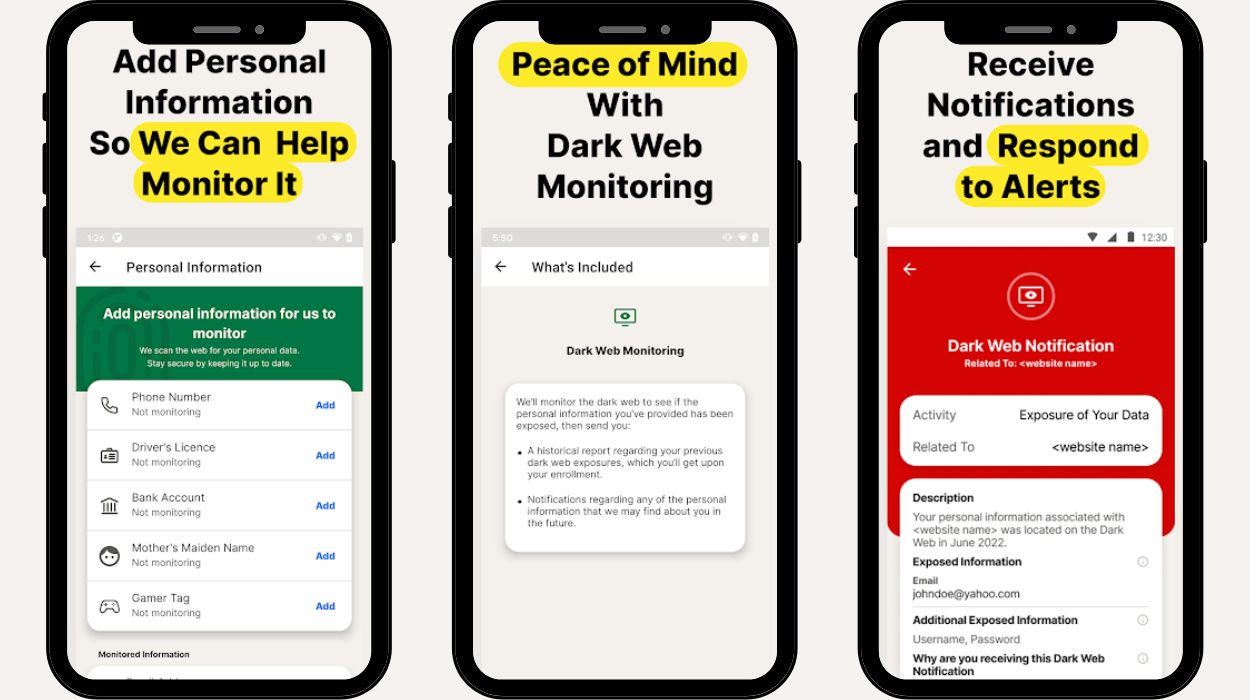
LifeLock keeps an eye on your personal info—like your Social Security number, name, and address—and alerts you if it’s used to apply for credit or services. It also scans the dark web for your data, including info from breached dating sites. If your identity gets stolen, their support team helps you recover, and higher-tier plans cover legal help and stolen funds. Some plans also bundle in Norton antivirus and a VPN for added online safety. You can also explore other VPN services like NordVPN to keep your digital activities secure.
2. Aura combines identity protection with digital security
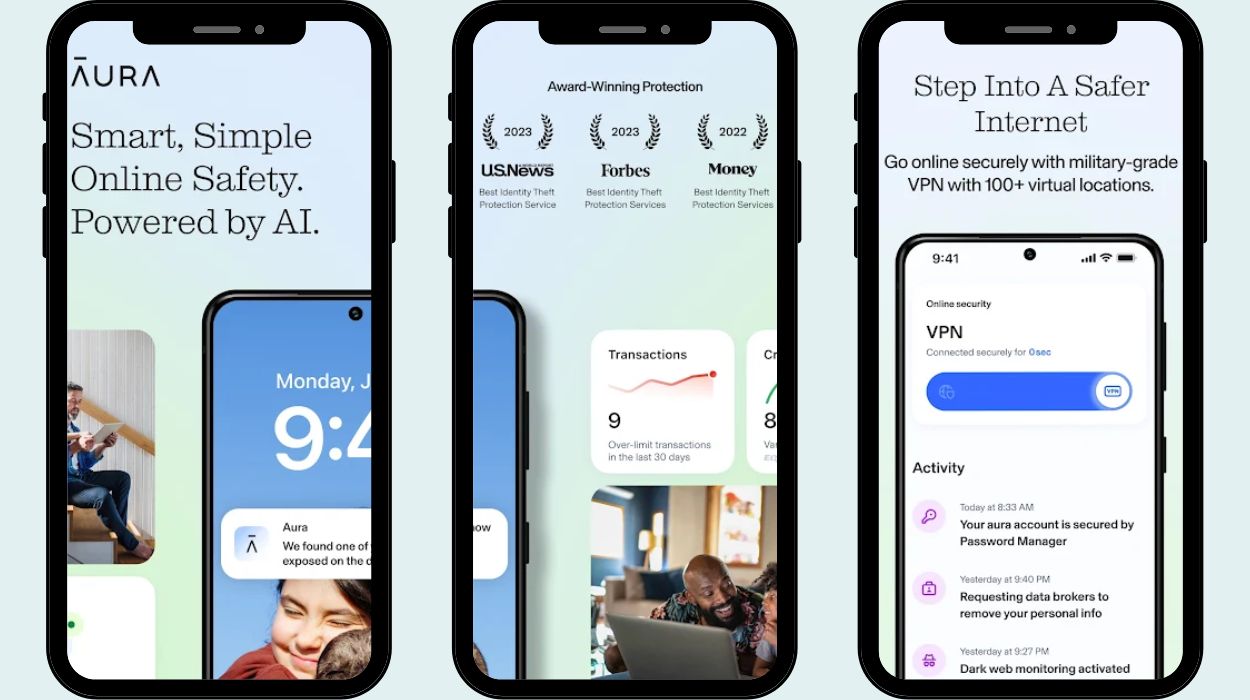
Aura watches your credit reports across all three bureaus and monitors things like bank accounts, criminal records, and dark web activity. It also includes tools like antivirus software, a VPN, a password manager, and call/text spam blockers. Plans are available for individuals, couples, or families (up to five adults), which makes it easy to protect your household. You also get $1 million in identity theft insurance and access to 24/7 US-based support.
3. IdentityGuard uses AI to detect fraud fast
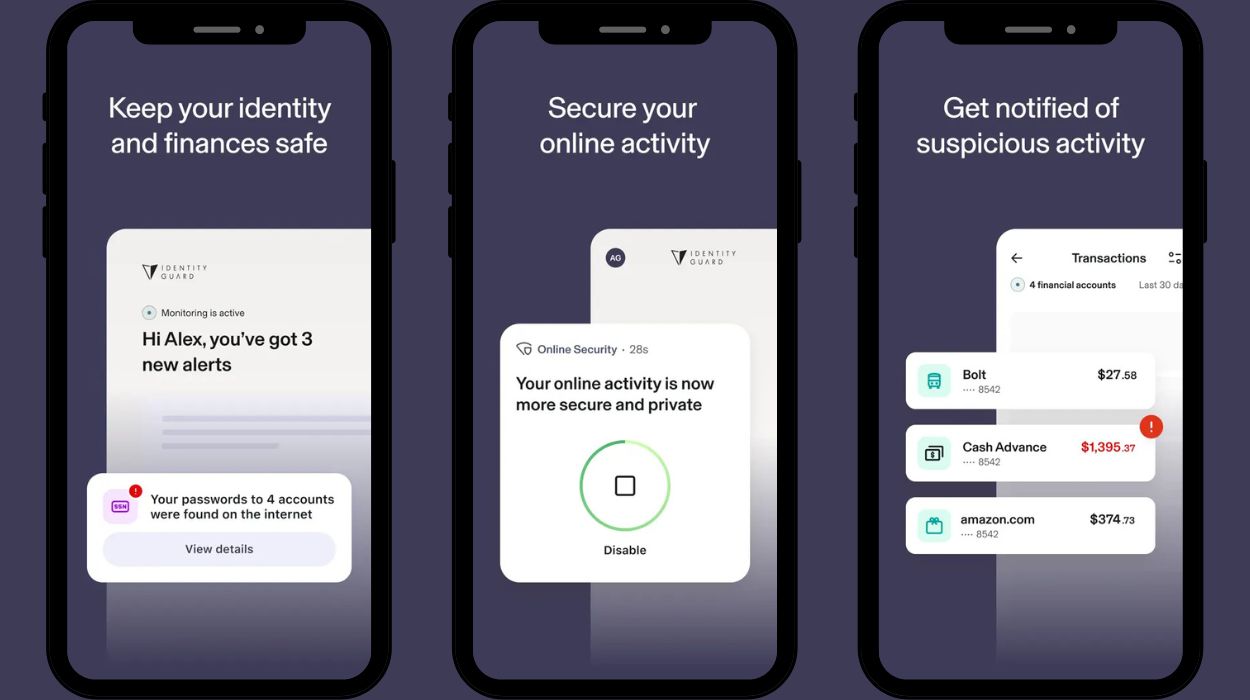
IdentityGuard uses IBM Watson to spot suspicious activity tied to your personal and financial information. It offers credit monitoring (one- or three-bureau depending on the plan), plus alerts on bank accounts, credit cards, and even retirement accounts. There’s a browser extension to help block phishing attempts, and all plans include $1 million insurance. With flexible family plans and 24/7 support, it’s a solid choice if you want a hands-on team and tech that keeps up.
How do these services specifically help someone worried about dating scams? Imagine a scammer somehow got hold of your personal details during a romance scam attempt – maybe you shared your full name, address, and birthday. Worst-case, say they also tricked you into giving your bank or Medicare info.
An identity protection service would alert you if your info is being used to open credit cards, if your bank account had an unusual change, or if your SSN popped up somewhere it shouldn’t. They often catch things you might not notice until it’s too late. Having a service in place means you don’t have to keep constant vigil. You can focus on real connections while your digital “watchdog” handles the rest.
What To Do If You’ve Been Scammed
Despite all the precautions, it’s possible that you or someone you know might fall victim to a dating scam. First, take a deep breath. It’s important to remember you’re not alone and not to blame yourself for being “so naive” or “foolish”. These criminals are extremely convincing, and can get the best of the savviest of people. Your immediate focus in the aftermath of an online dating scam should be figuring out what to do next. Here’s a step-by-step guide to limit the damage, report the crime, and start recovering:
1. Cut all contact with the scammer
The moment you suspect you’ve been scammed, stop communicating. Don’t respond to calls, texts, or emails, and definitely don’t send more money. Block them everywhere—phone, email, dating apps, and social media. If they’ve shared any links or apps, stop using those too. Cutting them off quickly reduces the chance of more harm.
2. Talk to someone you trust
You don’t have to deal with this alone. Tell a close friend or family member what happened—they can offer emotional support and help you think clearly about what to do next. No one is immune to scams.
If you’re unsure who to talk to, call the AARP Fraud Watch Helpline at 877-908-3360 or find an online support group for scam victims.
3. Save all the evidence
Keep messages, emails, and payment records. Don’t delete anything out of embarrassment—it’s useful for reporting. Take screenshots showing the scammer’s profile and conversations, and write down their name, story, and any account details they gave. This info can help if you report the scam or try to recover your money.
Related Reading: 10 Steps To Recover If You’re Being Fooled By Someone You Love
4. Report the scam
Letting the right people know helps others and might help you too. File reports with:
- FTC: Go to reportfraud.ftc.gov
- FBI IC3: File a complaint at ic3.gov
- Local police: It creates a record, which helps with insurance or disputes
- Dating app: Report the user so others don’t get tricked
- Companies involved: Like Western Union, gift card providers, or money apps

5. Tell your bank ASAP
If you send money or shared financial info, call your bank or credit card company right away. Ask about stopping or reversing payments. If your account details were shared, consider closing that account. Cancel and replace credit cards, and change any passwords you shared.
6. Place a fraud alert or credit freeze
If the scammer got your personal info—like your Social Security number—put a fraud alert or freeze on your credit. This stops them from opening new accounts in your name. It’s free and easy through any of the three credit bureaus.
Related Reading: 11 Virtual Dating Mistakes Everyone Makes But YOU Can Avoid!
7. Watch out for recovery scams
Sadly, scammers sometimes strike twice. Be wary of anyone offering to help you get your money back for a fee. Real law enforcement agencies don’t charge for investigations. Always check with someone you trust before engaging with anyone new.
Final Thoughts
Online dating can be a wonderful experience in your golden years—don’t be afraid, just be prepared. By learning the red flags and setting healthy boundaries, you can enjoy new connections while staying safe. Here are a few things to be mindful of at all times:
- Trust takes time and a real person, who’s interested in you, will respect your pace. Anyone rushing you is a red flag
- You have the right to say “no.” A genuine partner won’t pressure you to share info or send money
- Stay in control. You choose when and how to communicate or meet. Scammers try to take over—don’t let them
- Knowledge is power. Now that you know the tricks, you’re much harder to fool
- Most people are good. With caution and confidence, you can meet kind, honest partners online
Trust your instincts, stay vigilant, and enjoy the journey. You deserve love—and now, you’re ready to find it safely.
The Art Of Online Dating: Navigating The World Of Apps And Websites
Your contribution does not constitute a charitable donation. It will allow Bonobology to continue bringing you new and up-to-date information in our pursuit of helping anyone in the world to learn how to do anything.

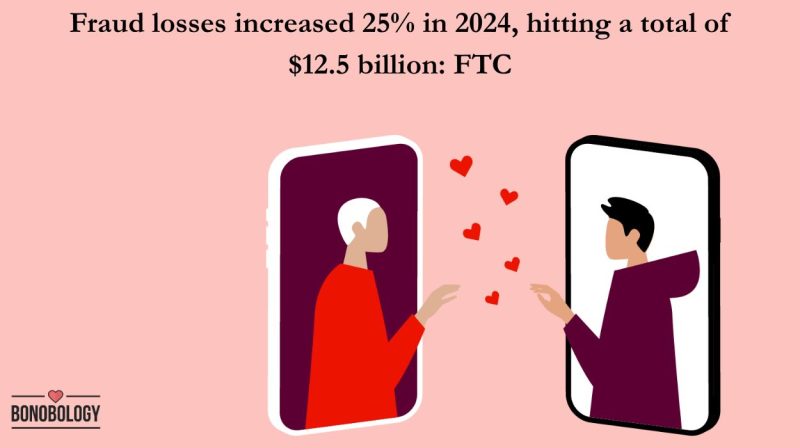






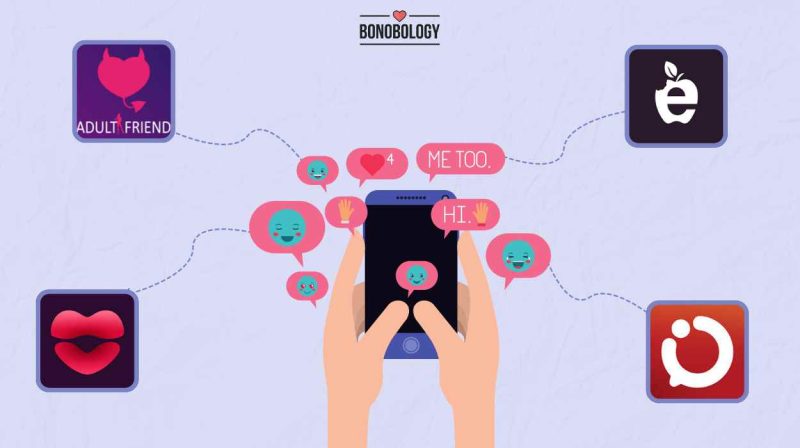


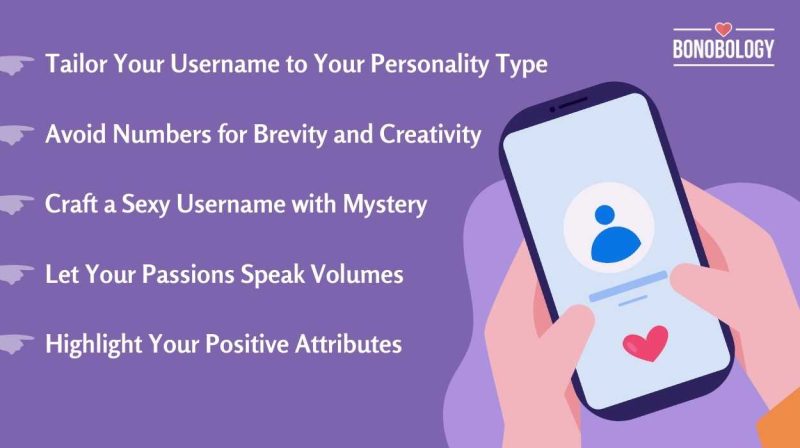
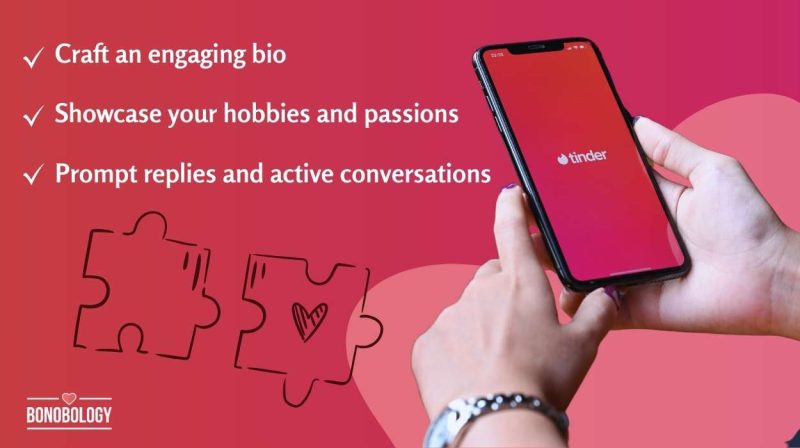



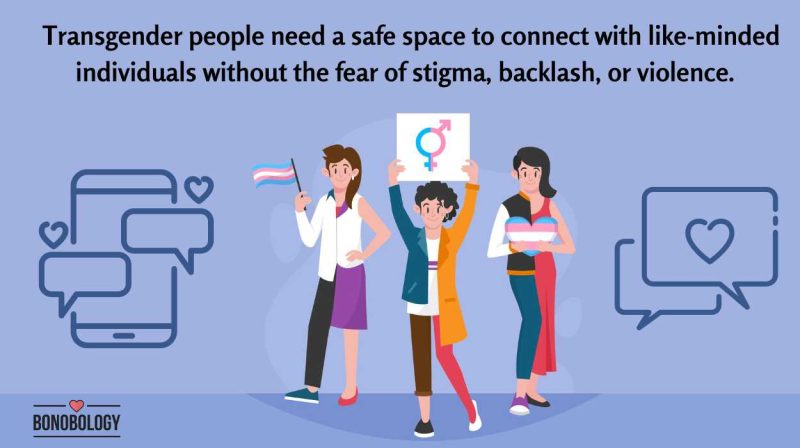


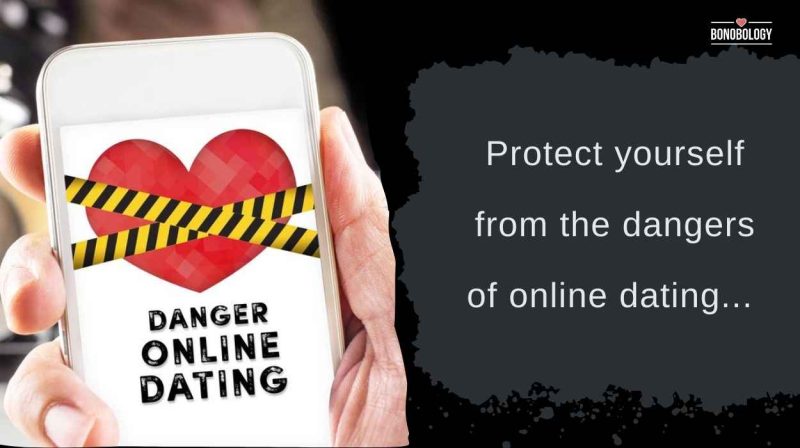


Featured
9 Best Dating Sites for Professionals Over 50
21 Best Hookup Apps For Those Looking To Get Laid
How To Text A Girl For The First Time: 15 Tips And 75 Examples
15 International Dating Sites — Broaden Your Search For Love
15 Real Mature Female Dating Profile Examples
9 Best Safe Dating Sites For Over 50
15 Best Dating Apps For Cheating | 2025
❤️ Meaning From A Girl—5 Interpretations And How To Respond
Looking For The Perfect Headline For Dating Site? 200+ Ideas
200+ Ideas For A Username For Dating Site — Set Yourself Apart
10 Actionable Steps To Increase Tinder Matches
13 Genuine Tips To Help You Slide Into Someone’s DMs
65 Best Instagram Pickup Lines To Start A Conversation
How To Find A Millionaire To Date: 10 Ways To Attract A Millionaire Man
9 Best Trans Dating Apps And Sites: Top Expert Picks
50 Incredible Responses To The “Dating Me Is Like” Hinge Prompt
100 Best Hinge Conversation Starters To Get You To The Talking Stage
10 Best Background Check Sites For Dating In 2025
69 Flirty Dares Over Text To Spice Things Up
The Art Of Online Dating: Navigating The World Of Apps And Websites